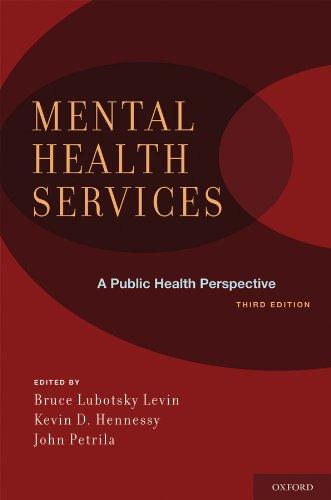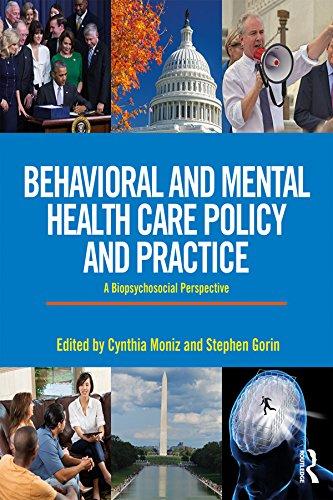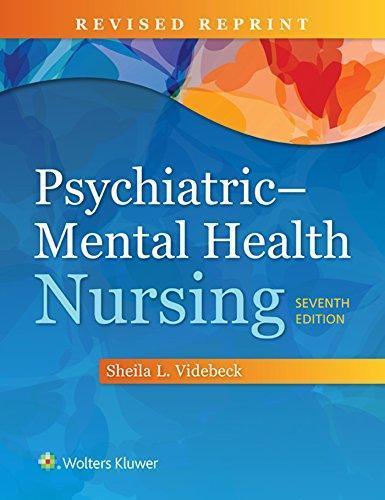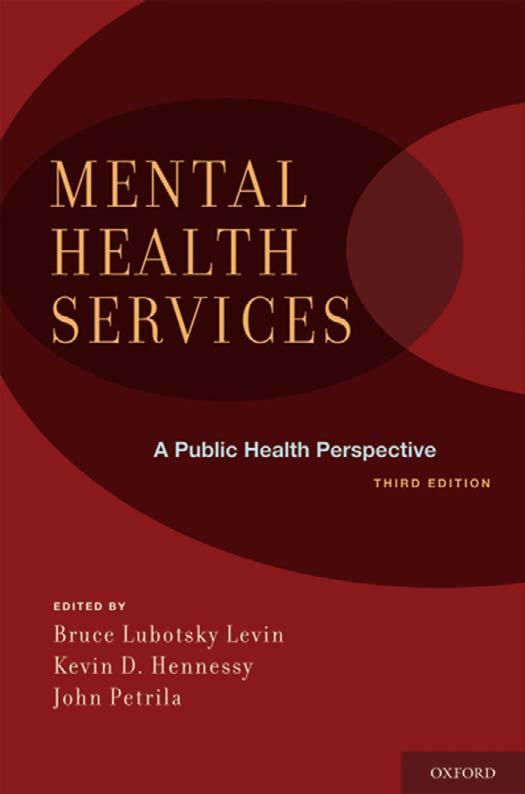https://ebookmass.com/product/mental-health-services-a-
Instant digital products (PDF, ePub, MOBI) ready for you
Download now and discover formats that fit your needs...
Behavioral and Mental Health Care Policy and Practice: A Biopsychosocial Perspective – Ebook PDF Version
https://ebookmass.com/product/behavioral-and-mental-health-carepolicy-and-practice-a-biopsychosocial-perspective-ebook-pdf-version/
ebookmass.com
Psychiatric Mental Health Nursing Seventh, North American Edition – Ebook PDF Version, Revised – Ebook PDF Version
https://ebookmass.com/product/psychiatric-mental-health-nursingseventh-north-american-edition-ebook-pdf-version-revised-ebook-pdfversion/
ebookmass.com
Essentials of Public Health (Essential Public Health) 3rd Edition, (Ebook PDF)
https://ebookmass.com/product/essentials-of-public-health-essentialpublic-health-3rd-edition-ebook-pdf/
ebookmass.com
The Parrot in the Mirror: How evolving to be like birds made us human Antone Martinho-Truswell
https://ebookmass.com/product/the-parrot-in-the-mirror-how-evolvingto-be-like-birds-made-us-human-antone-martinho-truswell/
ebookmass.com
War-Time Care Work and Peacebuilding in Africa: The Forgotten One 1st ed. 2020 Edition Fatma Osman Ibnouf
https://ebookmass.com/product/war-time-care-work-and-peacebuilding-inafrica-the-forgotten-one-1st-ed-2020-edition-fatma-osman-ibnouf/
ebookmass.com
Windows® 10 All-in-One For Dummies®, 4th Edition Woody
Leonhard
https://ebookmass.com/product/windows-10-all-in-one-for-dummies-4thedition-woody-leonhard/
ebookmass.com
Sexual Crime and Trauma 1st ed. Edition Helen Swaby
https://ebookmass.com/product/sexual-crime-and-trauma-1st-ed-editionhelen-swaby/
ebookmass.com
The Mysteries of Bilingualism François Grosjean
https://ebookmass.com/product/the-mysteries-of-bilingualism-francoisgrosjean/
ebookmass.com
Jingle Bell Wolf Terry Spear
https://ebookmass.com/product/jingle-bell-wolf-terry-spear-2/
ebookmass.com
Dancing with the Enemy (A Night to Remember Book 1) Cassie Mint
https://ebookmass.com/product/dancing-with-the-enemy-a-night-toremember-book-1-cassie-mint/
ebookmass.com
William
This page intentionally left blank
ABBREVIATIONS
AAGP American Association for Geriatric Psychiatry
ACT Assertive Community Treatment
ADA Americans with Disabilities Act
ADHD attention-deficit/hyperactivity disorder
AHCPR Agency for Health Care Policy and Research
AHRQ Agency for Healthcare Research and Quality
AoA Administration on Aging
CASSP Child and Adolescent Service System Program
CATIE Clinical Antipsychotic Trials of Intervention Effectiveness
Child STEPs MacArthur Foundation Child System and Treatment Enhancement Projects
CIDI Composite International Diagnostic Interview
CIT Crisis Intervention Teams
CJ-DATS Criminal Justice Drug Abuse Treatment Studies
CMHBG Community Mental Health Block Grant
CMHCs community mental health centers
CMHI Children’s Mental Health Initiative
CMHS Center for Mental Health Services
CMS Centers for Medicare and Medicaid Services
CPES Collaborative Psychiatric Epidemiology Surveys
CSAT Center for Substance Abuse Treatment
CUtLASS Cost Utility of the Latest Antipsychotic Drugs in Schizophrenia Study
DATOS Drug Abuse Treatment Outcomes Studies
DHHS U.S. Department of Health and Human Services
EBM evidence-based medicine
EBT evidence-based treatment
ECA Epidemiologic Catchment Area
EMRs electronic medical records
ERISA Employment Retirement and Security Act
ESMH expanded school mental health
EST empirically supported treatment
FDA Food and Drug Administration
FERPA Family Educational Right to Privacy Act
FQHCs Federally Qualified Health Centers
HCFA Health Care Financing Administration
Health IT health information technology
HEDIS Health Plan Employer Data and Information Set
HIPAA Health Insurance Portability and Accountability Act
HMO Health Maintenance Organization
HRSA Health Resources Services Administration
HSRR Health Services and Sciences Research Resources
HUD U.S. Department of Housing and Urban Development
IDEA Individuals with Disabilities Education Act
IMD Institutions for Mental Disease
IOM Institute of Medicine
MBHOs managed behavioral health care organizations
MCO managed care organization
MedPAC Medicare Payment Advisory Commission
MHCs mental health courts
MHSIP Mental Health Statistical Improvement Program
MHT-SIG Mental Health Transformation-State Incentive Grants
MMA Medicare Prescription Drug, Improvement, and Modernization Act
NAMBHA National Alliance of Multi-Ethnic Behavioral Health Associations
NAMHC National Advisory Mental Health Council
NAMI National Alliance on Mental Illness
NASMHPD National Association of State Mental Health Program Directors
NCCBH National Council for Community Behavioral Healthcare
NCS National Comorbidity Survey
NCS-R National Comorbidity Survey Replication
NESARC National Epidemiologic Survey on Alcohol and Related Conditions
NIAAA National Institute on Alcohol Abuse and Alcoholism
NIATx Network for the Improvement of Addiction Treatment
NIDA National Institute on Drug Abuse
NIH National Institutes of Health
NLAAS National Latino and Asian American Survey
NNED National Network to Eliminate Disparities in Behavioral Health
NREPP National Registry of Evidence-Based Programs and Practices
NSAL National Survey of American Life
NSDUH National Survey on Drug Use and Health
N-SSATS National Survey of Substance Abuse Treatment Services
OAA Older Americans Act
OBRA Omnibus Budget Reconciliation Acts
PACE Program for All-Inclusive Care for the Elderly
PASRR Preadmission Screening and Resident Review
PBM Pharmacy Benefit Manager
PDP Prescription Drug Plan
POS Point of Service
PPO Preferred Provider Organization
RTI Response to Intervention
SAMHSA Substance Abuse and Mental Health Services Administration
SAP Student Assistance Program
SBHC school-based health center
SCAP socio-cultural assessment protocols
SCHIP State Children’s Health Insurance Program
SED severe emotional disturbance
SIM Sequential Intercept Model
SMH school mental health
SMHA state mental health agency
SMI severely mentally ill, severe mental illness
SPMI Severe, persistent mental illness
SSDI Social Security Disability Income
SSI Supplemental Security Income
SSRI Selective Serotonin Reuptake Inhibitor
TOPS Treatment Outcome Prospective Study
TSIGs Transformation Systems Improvement Grants
URS Uniform Reporting System
VA Department of Veterans Affairs
WHCoA White House Conference on Aging
WHO World Health Organization
WHO-DAS WHO Disability Assessment Schedule
WMH World Mental Health
This page intentionally left blank
CONTRIBUTORS
Sergio Aguilar-Gaxiola, M.D., Ph.D., is Professor of Internal Medicine, School of Medicine, University of California (UC), Davis. He is the Founding Director of the Center for Reducing Health Disparities at UC Davis Health System and is Co-Chair of the National Institutes of Health’s Community Engagement Key Function Committee for the Clinical and Translational Science Awards. Dr. Aguilar-Gaxiola is the Coordinator for Latin America and the Caribbean of the World Health Organization’s World Mental Health Surveys Consortium, and his research includes cross-national epidemiologic studies on patterns and correlates of mental disorders and understanding and reducing health disparities in underserved populations.
Jordi Alonso, M.D., Ph.D., is the head of the Health Services Research Unit of the Institut Municipal d’Investigació Mèdica (IMIM-Hospital del Mar). He is a Professor at the Pompeu Fabra University (UPF), Barcelona, where he is the Director of the Master’s Program in Public Health and also an Associate Professor at Johns Hopkins Bloomberg School of Public Health. Dr. Alonso has published over 400 scientific articles in the area of health outcomes research.
William A. Anthony, Ph.D., is Director of Boston University’s Center for Psychiatric Rehabilitation and a Professor in the College of Health and Rehabilitation Sciences at Boston University. In 1992, Dr. Anthony received the Distinguished Service Award from the President of the United States for his efforts “in promoting the dignity, equality, independence and employment of people with disabilities.” He has written extensively on the topic of psychiatric rehabilitation, and has authored or co-authored over 100 articles in professional journals, 16 textbooks, and several dozen book chapters.
Lori Ashcraft, Ph.D., is the Executive Director for the Recovery Innovations Recovery Opportunity Center. She has developed several curricula to help individuals with psychiatric experiences move beyond recovery by finding their purpose, making their own unique contribution, and using their experiences to help others grow and recover, skills based on her own personal experiences of having struggled with severe depression most of her life. Previously, Dr. Ashcraft served as the Deputy Director for Community Programs in the California Department of Mental Health, Director for Adult Services for the Arizona Regional Behavioral Health Authority, and Executive Director of the Recovery Education Center.
Stephen J. Bartels, M.D., M.S., is Professor of Psychiatry and Professor of Community & Family Medicine at Dartmouth Medical School. He is the Director of Dartmouth’s Centers for Health and Aging and oversees the Center for Aging Research, the Northern New England Geriatric Education Center, and the Dartmouth-Hitchcock Center for Senior Health, as well as serving as the Medical Director for New Hampshire’s Bureau of Elder Services. Dr. Bartels has authored or co-authored over 130 peer-reviewed articles, monographs, and book chapters, and has served in a variety of national leadership roles in the field of geriatrics.
Crystal R. Blyler, Ph.D., is a Social Science Analyst with the Substance Abuse and Mental Health Services Administration. An experimental psychologist by training, Dr. Blyler has served for the past 10 years as a project officer for evaluations of the federal Center for Mental Health Services’ discretionary grant portfolio, including: transformation of state mental health systems, supported employment, consumeroperated services, disability work incentives, and comprehensive services for transition-aged youth with serious mental illnesses and emotional disturbances.
Robert W. Burke, Ph.D., is an Associate Professor in the Department of Teacher Education at Miami University in Oxford, Ohio, where he teaches courses in the Early Childhood Education Preparation Program. In his previous work with children and families, he served as an elementary school teacher in grades K-5 for twelve years as well as an additional seven years as a caseworker in both mental health and juvenile justice agencies. His teaching, research, and service agendas examine the intersection of individual, group, and political dynamics of teaching and learning at kindergarten to sixth-grade levels, with a particular focus on the “Psychosocial Curriculum” that encompasses the mental health dimensions inherent in teachers’ and students’ shared lives in classrooms.
Tina Crenshaw, Ph.D., M.S.Ed., M.L.S., is a psychologist affiliated with the National Center for Posttraumatic Stress Disorder within the U.S. Department of Veterans Affairs. She has worked previously as a psychologist, librarian, research writer, and electronic information resource manager. Dr. Crenshaw holds advanced degrees in clinical psychology, educational psychology, and library science.
Karen J. Cusack, Ph.D., is an Assistant Professor in the Department of Psychiatry and a Research Fellow at the Cecil G. Sheps Center for Health Services Research at the University of North Carolina at Chapel Hill. Previously, Dr. Cusack
completed a National Research Service Award postdoctoral fellowship jointly sponsored by the University of North Carolina at Chapel Hill and Duke University. His research focuses on post-traumatic stress disorder and substance abuse, cognitivebehavioral interventions, and the intersection of mental health and criminal justice, areas in which she has published extensively.
Faith B. Dickerson, Ph.D., M.P.H., is Director of Psychology at the Sheppard Pratt Health System. She also heads the Sheppard Pratt Stanley Research Program and chairs the Sheppard Pratt Institutional Review Board. Dr. Dickerson holds adjunct appointments in the Department of Psychiatry at the University of Maryland and at the Johns Hopkins School of Medicine, and her research interests focus on health services for persons with serious mental illness and the role of infectious agents and other environmental factors in schizophrenia and bipolar disorder.
Marisa Elena Domino, Ph.D., is an Associate Professor of Health Economics in the Department of Health Policy and Administration at the University of North Carolina at Chapel Hill. Dr. Domino’s research interests include the economics of mental health, agency relationships among physicians, patients, and insurers, the diffusion of new technologies, and the public provision of health care and health insurance to low income populations. She has published scholarly work on the impact of managed care on treatment selection for depression in both public and private settings, the impact of managed care on the field of psychiatry, behavioral health carve-outs, and the effect that Medicare Part D has on individuals with severe mental illness.
Thomas W. Doub, Ph.D., is the Chief Operating Officer for Centerstone Research Institute in Nashville, Tennessee. He works with academic researchers and clinicians across the United States toward the goal of providing access to the most innovative mental health and addiction treatments. Dr. Doub oversees Centerstone’s community mental health research portfolio, and directs efforts to implement these findings into clinical practice.
Joel F. Farley, R.Ph., Ph.D., is an Assistant Professor in the Division of Pharmaceutical Outcomes and Policy in the Eshelman School of Pharmacy at the University of North Carolina at Chapel Hill. Dr. Farley’s research focuses on the impact of Medicaid prescription managed care policies on economic and clinical outcomes in vulnerable patient populations. Currently, he is examining Medicaid data to assess the effect of prescription benefit changes on patterns of care for individuals with schizophrenia.
Paul Flaspohler, Ph.D., is an Assistant Professor of Clinical Psychology and the Director of Program Development and Evaluation for the Center for School-Based Mental Health Programs at Miami (Ohio) University. In addition to applied work in community development and program evaluation, he assists schools and communities identifying needs and developing solutions for community problems. Dr. Flaspohler’s current projects include the Evidence-Based Practices for SchoolWide Prevention Programs (funded by the Health Foundation of Great Cincinnati)
and the development of a network of University-Community partnerships supporting expanded School Mental Health (EPIC).
Howard H. Goldman, M.D., Ph.D., is Professor of Psychiatry at the University of Maryland School of Medicine, where he directs the Mental Health Systems Improvement Collaborative. Dr. Goldman was the Senior Scientific Editor of Mental Health: A Report of the Surgeon General, and he is the Editor of Psychiatric Services
Junius J. Gonzales, M.D., M.B.A., is founding Dean of the College of Behavioral & Community Sciences and Executive Director of the Louis de la Parte Florida Mental Health Institute at the University of South Florida. Dr. Gonzales is a psychiatrist and health services researcher who previously served as Principal and Scientist at Abt Associates, as well as Chief of the Services Research & Clinical Epidemiology Branch and Acting Director for the Division of Services & Intervention Research at the National Institute of Mental Health.
Jan Goodson, B.S., is Director of Grant Writing for the Centerstone Research Institute. She oversees the development and submission of all grant proposals to government and private sector funders in order to sustain, enhance, and expand the prevention, treatment, and research of mental health and substance abuse disorders in Tennessee and Indiana. Ms. Goodson is Grant Professional Certified by the American Association of Grant Professionals.
Julie Goldstein Grumet, Ph.D., is a clinical psychologist currently with the Washington, D.C., Department of Mental Health. Dr. Grumet is the Prinicipal Investigator on a federally funded grant from the Substance Abuse and Mental Health Services Administration on the prevention of youth suicide. She has extensive experience in providing school-based mental health prevention, intervention, early intervention, and treatment to minority youth.
Sharon Green-Hennessy, Ph.D., is an Associate Professor of Psychology at Loyola University Maryland, where she teaches graduate seminars on child and adolescent psychopathology and its treatment. Prior to joining Loyola, Dr. GreenHennessy held a joint Instructor appointment in the Departments of Psychiatry at Johns Hopkins School of Medicine and Kennedy Krieger Institute. Dr. GreenHennessy is a licensed psychologist in Maryland, with research interests in access and barriers to mental health care among children and adolescents, child maltreatment, attachment theory, and the psychological assessment of children.
Ardis Hanson, M.L.S., is Director of the Research Library at the Louis de la Parte Florida Mental Health Institute at the University of South Florida (USF). Her interest in the use of technology to enhance research led Ms. Hanson to develop the Web site for the Library and the Institute in 1993 and, as Institute Webmaster, she has created a number of specialized research resources for Institute and Internet users. Ms. Hanson is an editor and author of texts in library and information sciences and is currently pursuing her doctoral degree in health and organizational communication at USF.
Kevin D. Hennessy, Ph.D., is a Senior Advisor within the Substance Abuse and Mental Health Services Administration (SAMHSA), where he provides leadership and guidance on issues of health care financing, workforce development, and translating research to practice for mental health and substance use services. Dr. Hennessy is a practicing clinical psychologist who previously served in the Office of the Assistant Secretary for Planning and Evaluation of the U.S. Department of Health and Human Services, and as a Senior Policy Advisor to the President’s New Freedom Commission on Mental Health. He is currently an Associate Editor of the Journal of Behavioral Health Services and Research.
Jill G. Hensley, M.A., currently serves as the Program Manager for the Substance Abuse and Mental Health Administration’s (SAMHSA) Fetal Alcohol Spectrum Disorders (FASD) Coordinating Center, which oversees efforts to implement evidence-based practices to prevent, diagnose, and address FASD across state, local, and juvenile court settings. Previously she served as Project Director for SAMHSA’s Co-Occurring Center for Excellence (COCE), a technical assistance and training center addressing co-occurring mental health and substance abuse disorders. Ms. Hensley has over 20 years of research, policy, and program experience in the areas of mental health and substance abuse treatment, HIV/AIDS, and criminal justice.
Michael Hogan, Ph.D., is Commissioner of Mental Health in New York. Dr. Hogan chaired the President’s New Freedom Commission on Mental Health in 2002–2003 and was appointed as the first behavioral health representative on the Board of the Joint Commission in 2007. He previously served as Director of the Ohio Department of Mental Health and Commissioner of the Connecticut Department of Mental Health, as well as President of the National Association of State Mental Health Program Directors (NASMHPD) and NASMHPD’s Research Institute.
Ronald C. Kessler, Ph.D., is a Professor of Health Care Policy at Harvard Medical School, where he leads a program in psychiatric epidemiology. Dr. Kessler is the Principal Investigator of the U.S. National Comorbidity Surveys and a Co-Director of the WHO World Mental Health Survey Initiative. He is a member of the Institute of Medicine and the National Academy of Sciences, and the ISI Web of Knowledge has rated Dr. Kessler the most highly cited researcher in the world in the field of psychiatry for each of the past nine years.
Sing Lee, M.B., B.S., FRCPsych, is a Professor at the Department of Psychiatry and the Director of the Hong Kong Mood Disorders Center, Faculty of Medicine, the Chinese University of Hong Kong. He is also lecturer at the Department of Social Medicine, Harvard Medical School, and the Asia-Pacific Coordinator of the World Mental Health Initiative. Dr. Lee’s principal research interest is mental health and social change in Chinese society.
H. Stephen Leff., Ph.D., is a Senior Vice President at the Human Services Research Institute (HSRI) and Associate Professor in the Harvard Medical School Department
of Psychiatry at the Cambridge Health Alliance. He directs The Evaluation Center at HSRI, a program to provide technical assistance nationally for the evaluation of adult mental health systems change, and has developed Web-based needs assessment and resource allocations tools for mental health planning. Dr. Leff’s research interests and work focus on mental health systems evaluation and planning, evidence-based practices, the measurement of cultural competency, fidelity measurement, and the linking of mental health evaluation and planning activities.
Bruce Lubotsky Levin, Dr.P.H., M.P.H., is Associate Professor and Head of the Graduate Studies in Behavioral Health Program at the Louis de la Parte Florida Mental Health Institute & the College of Public Health, both at the University of South Florida (USF). Dr. Levin is also Editor-in-Chief of the Journal of Behavioral Health Services & Research and Director of the USF Graduate Certificate in Mental Health Planning, Evaluation, & Accountability Program. He is Senior Editor of texts in women’s mental health, mental health, and public health for pharmacists, with research interests in managed behavioral health care, mental health policy, graduate behavioral health education, and mental health informatics.
Anne Lezak, M.P.A., is Principal of ADL Consulting, as well as a Senior Writer for Advocates for Human Potential, Inc., with an expertise in mental health policy and planning, homelessness, children’s mental health, and systems of care. Over the past 20 years, she has authored major reports, monographs, technical assistance materials, and grant submissions for a host of federal, state and national organizations.
Theodore C. Lutterman, B.A., is Director of Research Analysis at the National Association of State Mental Health Program Directors’ Research Institute (NRI). Mr. Lutterman has over 25 years experience working with state mental health agencies in the design, development, and implementation of national data compilation and research projects. Mr. Lutterman also directs the federally funded State Data Infrastructure Coordinating Center, which produces the State Mental Health Authority Revenue/Expenditure Study, the State Profiling System, and the Client Level Data Pilot Study.
Ronald W. Manderscheid, Ph.D., is Director of Mental Health and Substance Use Programs at the Global Health Sector of SRA International, and an Adjunct Professor at the Department of Mental Health, Bloomberg School of Public Health, Johns Hopkins University. At SRA, Dr. Manderscheid develops new demonstration and research projects around mental health and substance use services, programs, and systems, using a public health framework. Previously, Dr. Manderscheid served as Branch Chief, Survey and Analysis Branch, for the federal Center for Mental Health Services in the Substance Abuse and Mental Health Services Administration, where he served as Principal Editor for eight editions of Mental Health, United States.
Noel A. Mazade, Ph.D., is the founding Executive Director of the National Association of State Mental Health Program Directors’ Research Institute, Inc. Previously, he held managerial positions with the National Institute of Mental
Health, North Carolina Mental Health Legislative Study Commission, and the Oakland County (Michigan) Mental Health Services Board. He has held faculty appointments in psychiatry, public health, and social work at Harvard University, the University of North Carolina at Chapel Hill, and the University of Maryland.
Dennis McCarty, Ph.D., is a Professor in the Department of Public Health & Preventive Medicine at Oregon Health & Science University. He collaborates with policymakers in state and federal government and with community-based programs to examine the organization, financing, and delivery of publicly funded treatment services for alcohol and drug use disorders, and currently leads the national evaluation for the Network for Improvement of Addiction Treatment (NIATx), and directs the Oregon/Hawaii Node of the National Drug Abuse Treatment Clinical Trials Network (CTN). Previously, Dr. McCarty directed the Massachusetts Bureau of Substance Abuse Services for the Massachusetts Department of Public Health.
Kathleen Ries Merikangas, Ph.D., is Senior Investigator and Chief of the Genetic Epidemiology Branch in the Intramural Research Program at the National Institute of Mental Health (NIMH). Prior to joining the NIMH in 2002, Dr. Merikangas was Professor of Epidemiology and Public Health, Psychiatry, and Psychology and the Director of the Genetic Epidemiology Research Unit in the Department of Epidemiology and Public Health at the Yale University School of Medicine. Dr. Merikangas has authored or co-authored more than 300 scientific publications and has presented lectures throughout the United States and in more than 20 countries.
Rebecca Morris, M.P.A., is President of Gallais Communications, which specializes in health issues. Previously, while serving as Director of Communications for Advocates for Human Potential, Inc., she had lead writing/editing responsibilities on a contract supporting the Substance Abuse and Mental Health Services Administration’s (SAMHSA’s) Behavioral Health Workforce Development Initiative. Ms. Morris has written and edited a wide variety of health-related monographs, working papers, briefings, conference documentation, and other reports for agencies and organizations such as the U.S. Department of Health and Human Services, U.S. Department of Justice, the U.S. Office of National Drug Control Policy, the Annie E. Casey Foundation, and The Medical Foundation.
Dennis P. Morrison, Ph.D., is Chief Executive Officer (CEO) of Centerstone Research Institute, where he oversees all research and information technology activities for Centerstone, the largest community mental health care organization in the United States. Previously, he served as the CEO of the Center for Behavioral Health (CBH) in Bloomington, Indiana. Under his leadership, CBH received the Ernest A. Codman Award in 2003, the Nicholas E. Davies Award in 2006, and the Negley Award in 2007.
Noosha Niv, Ph.D., is currently the Associate Director of the Education and Dissemination Unit of the Desert Pacific Mental Illness Research, Education and Clinical Center. She conducts clinical and health services research examining the
treatment needs, utilization, and outcomes among individuals with severe mental illness, substance abuse disorders, and co-occurring disorders, as well as the influence of environmental and cultural factors on psychopathology and treatment outcomes. Dr. Niv received her doctoral degree in clinical psychology and completed a postdoctoral fellowship, both from the University of California, Los Angeles.
Fred C. Osher, M.D., is the Director of Health Systems and Health Services Policy at the Council of State Governments Justice Center and serves as a senior medical consultant to the Substance Abuse and Mental Health Services Administration’s Co-Occurring Center of Excellence. Dr Osher is a community psychiatrist with clinical, research, and policy interests in effective services for persons with serious mental illnesses and co-occurring substance use disorders, and he has published extensively in the areas of homelessness, community psychiatry, co-occurring disorders, and effective approaches to justice involving persons with behavioral health disorders. Dr. Osher has a history of public-sector service at local, state, and federal levels, including the federal Center for Mental Health Services and the National Institute of Mental Health.
Airia Sasser Papadopoulos, M.P.H., is an Assistant in Research in the Department of Mental Health Law and Policy at the Louis de la Parte Florida Mental Health Institute, University of South Florida. Ms. Papadopoulos currently coordinates a state-funded study of Medicaid-funded behavioral health services. She is studying for a Ph.D. in Applied Anthropology with research interests that include racial disparities in mental health, particularly in the diagnosis and treatment of depression among African Americans, and the connection between depression and obesity among adolescents.
Carl E. Paternite, Ph.D., is Professor and Chair of the Department of Psychology at Miami University in Oxford, Ohio, where he has been on the faculty for 30 years. He is the founding and current director of the Center for School-Based Mental Health Programs in the Department of Psychology and also directs the Ohio Mental Health Network for School Success, a joint venture of the Ohio Department of Mental Health and the Ohio Department of Education. Dr. Paternite has particular expertise in approaches to involve educators more fully within school mental health efforts; public policy advocacy and moving policy to action; school mental health workforce development issues; and formative evaluation of school mental health programs; and he has published extensively in edited books and peer-reviewed journals.
John Petrila, J.D., L.L.M., is a Professor in the Department of Mental Health Law & Policy at the University of South Florida. He is a member of the MacArthur Foundation Research Network on Mandated Community Treatment and Past President of the International Association of Forensic Mental Health Services. He is also co-editor of Behavioral Sciences and Law, and publishes frequently on mental health law and policy issues.
Bernadette E. Phelan, Ph.D., is a Senior Research Advisor at the National Association of State Mental Health Program Directors’ Research Institute and
concurrent President of Phelan Research Solutions, Inc. She has experience in the field of behavioral health as an evaluator, researcher, and grant Principal Investigator. Previously, Dr. Phelan was the Chief of Research and Special Projects for the Division of Behavioral Health within the Arizona Department of Health Services, as well as Assistant Director of the Arizona Medical Board.
Allison D. Redlich, Ph.D., is an Assistant Professor in the School of Criminal Justice at the State University of New York at Albany. She conducts research on Mental Health Courts and other forms of criminal justice diversion and is a nationally recognized expert with extensive publications on police interrogations and false confessions, particularly with vulnerable populations such as persons with mental illness and juveniles. Dr. Redlich serves on the executive committee of the American Psychology-Law Society (Division 41 of the American Psychological Association), as well as on the editorial boards of three journals.
Traci Rieckmann, Ph.D., is a Research Assistant Professor in the Center for Substance Abuse Research and Policy in the Department of Public Health and Preventive Medicine at Oregon Health & Science University. Dr. Rieckmann’s research focuses on the organization and delivery of drug abuse treatment services, primarily in the translation of research to practice and the implementation of evidence-based practices, as well as assessing disparities in access and retention in care and adapting practices for American Indian/Alaskan native communities. Her clinical work has focused primarily on adolescents and adults with substance abuse and co-occurring disorders.
Steven S. Sharfstein, M.D., M.P.A., is President and Chief Executive Officer of the Sheppard Pratt Health System, where he has worked for 22 years. He is also Clinical Professor and Vice Chair of Psychiatry at the University of Maryland, and previously served in various positions at the National Institute of Mental Health. A practicing clinician for more than 30 years, he is best known for his extensive research and writing on the economics of practice, and public mental health policy.
Tevfik Bedirhan Üstün, M.D., is the Coordinator of Classifications, Terminologies, and Standards in the World Health Organization (WHO). Dr. Üstün is also the Co-Director of the WHO World Mental Health Survey Initiative and is currently responsible for the WHO’s Family of International Classifications (ICD, ICF and other health classifications), standardized health terminologies, and health information standards. He has authored or co-authored more than 200 articles and several books on psychiatry, primary care, classifications, and health assessment.
Aricca D. Van Citters, M.S., has over ten years of experience in the evaluation of mental health services and interventions for older adults. She has specialized in health care quality improvement, health promotion, and the implementation and dissemination of evidence-based practices. Ms. Van Citters has an extensive background in conducting outcomes evaluations and has provided technical assistance in implementing geriatric mental health services, developed curriculum for educating early career investigators in community-based geriatric mental health research,
and developed educational materials for implementing effective late-life depression programs.
Philip S. Wang, M.D., Dr.P.H., is the Deputy Director of the National Institute of Mental Health (NIMH). Prior to joining NIMH, he served on the faculty at Harvard Medical School, where his research focused on effectiveness trials, pharmacoepidemiology, pharmacoeconomics, and health services research.
Mark D. Weist, Ph.D., is a Professor at the University of Maryland, School of Medicine, and serves as the Director of the Center for School Mental Health, one of two federally funded national centers providing leadership in the advancement of school mental health policies and programs in the United States. Dr. Weist is an internationally known children’s mental health expert who has published extensively, advised national research and policy committees, testified before Congress, and presented to the President’s New Freedom Commission on Mental Health on issues of school mental health, trauma, violence and youth, and evidence-based practice. He and other colleagues have founded the journal Advances in School Mental Health Promotion
Alexander S. Young, M.D., M.S.H.S., is Director of the Health Services Unit of the Department of Veterans Affairs Desert Pacific Mental Illness Research, Education and Clinical Center, and Professor at the UCLA Department of Psychiatry. He is a national expert and has published extensively regarding the evaluation and improvement of mental health care quality, and the use of health informatics. Dr. Young has received numerous honors, including the American Psychiatric Association 2000 Early Career Health Services Research Award, and the National Alliance for the Mentally Ill 2002 Exemplary Psychiatrist Award.
Samuel H. Zuvekas, Ph.D., is Senior Economist and Deputy Director, Division of Social and Economic Research in the Center for Financing, Access and Cost Trends at the Agency for Healthcare Research and Quality (AHRQ). His research interests include the economics of mental health and substance abuse, health care finance and expenditures, and access to care. Dr. Zuvekas currently serves as chair of the World Psychiatric Association’s Section on Mental Health Economics and is a member of the editorial boards of the Journal of Mental Health Policy and Economics and the Journal of Behavioral Health Services & Research.
PREFACE
Thisnew Third Edition of Mental Health Services: A Public Health Perspective is being completed in the midst of public debate over President Obama’s health care reform proposals. Debate over health care is hardly new. The First Edition of this text was published in 1996, shortly after the rejection of President Clinton’s health care reform proposal. The Second Edition of this text was published in 2004, shortly after President Bush’s New Freedom Commission on Mental Health had issued its final report decrying the state of public mental health in the United States.
This brief timeline illustrates three points central to the reasons we have developed this text as well as this new Third Edition. First, health care is an issue of the highest importance in the United States. Second, there is broad dissatisfaction with virtually every aspect of the health care systems in the United States, including access, cost, and outcomes. And third, mental health delivery systems, in particular, have changed fundamentally in the last two decades in ways that make it essential to consider mental health care not as an isolated specialty sector but as an important part of public health.
This new Third Edition, like its predecessors, examines the critical issues in the organization, financing, delivery, and evaluation of mental health services in the United States. It covers issues that lie at the heart of all public health sectors, such as epidemiology, treatment, and policy, examining those issues in the context of people with mental disorders. It also includes topics of special concern to mental health administrators, policymakers, planners, evaluators, and treatment professionals, such as criminal justice, co-occurring disorders, and the economics of psychopharmacology. In addition, this new Third Edition has been reorganized to add new chapters on specific treatment sectors that provide mental health services,
including state mental health agencies, community mental health providers, and specialty hospitals and psychiatric units within general hospitals. There are also new chapters on workforce development and the global burden of mental disorders.
Like the previous two editions, the development and organization of the Third Edition has been influenced by the experiences of the editors. One editor of this volume (BLL) has developed and teaches in the Graduate Studies in Behavioral Health Program, a collaborative teaching initiative between the Florida Mental Health Institute (now an academic component of the USF College of Behavioral and Community Sciences) and the College of Public Health, both at the University of South Florida. This program is one of only several of the 41 accredited schools of public health in the United States and Puerto Rico offering a concentration in behavioral health (i.e., alcohol, drug abuse, and mental health services). Another editor of this volume (JP) has taught graduate courses in health care law and disability law and also provides legal consultation to public mental health systems across the United States. The editors of this text have also served as administrators in public mental health systems (JP) and in the federal government (KDH), and provide mental health services directly in a variety of clinical settings (KDH). All of the editors have worked with mental health professionals and mental health services researchers throughout the United States. These varied experiences have convinced us that it is impossible to understand issues in mental health services unless those issues are considered within the context of a public health framework. This means that an interdisplinary approach to the topic is essential. The result is that the Third Edition, like the previous two, draws from nationally prominent academicians, researchers, and other experts from a variety of backgrounds and disciplines. Each expert understands his or her mental health/substance abuse specialty, but also appreciates the broader public health context in which that specialty exists. These experts have made it possible to provide an integrated text that can be used by graduate students in public health, social work, psychiatric nursing, psychology, applied anthropology, and public administration. We also have designed the book as a reference and handbook for administrators, researchers, practitioners, and policymakers who work with mental health issues at the local, state, or national levels. In brief, it can also be used by any individual or organization involved in some aspect of mental health systems delivery in the United States in the twenty-first century.
Organization of the Third Edition
The Third Edition is divided into three major parts: Part I—Services Delivery Issues; Part II—Selected Populations and Treatment Settings; and Part III—Special Issues.
Part I, Services Delivery Issues, includes five chapters that provide information regarding the defining characteristics of mental health systems. In Chapter 1, we provide an overview of the changes in public mental health systems over the last two decades, and place those changes in a broader public health framework. Chapter 2, written by Samuel H. Zuvekas, discusses financing of mental health
and substance abuse services and the impact of managed care. In Chapter 3, Petrila and Levin describe the impact of the legal system on mental health services, organizations, and client rights. Chapter 4, by Kevin Hennessy, discusses quality assurance. Finally, Rebecca Morris and Anne Lezak discuss the role of workforce development, a new topic for this book.
Part II of this new edition is divided into two sections. Section A deals with the special populations that have emerged as key areas of focus in service delivery. Chapter 6, by Philip S. Wang and colleagues, addresses the global impact of mental disorders, reminding the reader that the issues discussed in this text are not confined to the United States. In Chapter 7, Ron Kessler and colleagues provide the latest data available on the epidemiology of mental disorders. After the overviews provided in Chapters 6 and 7, the next five chapters focus on specific populations. Sharon Green-Hennessy writes about children and adolescents in Chapter 8, while Alex Young and Noosha Niv focus on adults in Chapter 9. In Chapter 10, Steven Bartels and Aricca D. Van Citters discuss issues involving older adults. Dennis McCarty and Traci Rieckmann explore treatment systems for alcohol and drug use disorders in Chapter 11, while Fred Osher and colleagues focus in Chapter 12 on the public health implications of co-occurring addictive and mental disorders.
Section B of Part II provides an overview of the specific treatment settings in which mental disorders are most commonly assessed and treated. Chapter 13, by Ted Lutterman and colleagues, discusses the current status of state mental health agencies in America. Tom Doub and colleagues focus on community mental health centers in Chapter 14, and, in Chapter 15, Faith Dickerson and Steve Sharfstein discuss specialty pychiatric hospitals and psychiatric units within hospitals. In Chapter 16, Ron Manderscheid examines the essential but sometimes overlooked topic of the integration of primary care and specialty mental health services. Mark Weist and colleagues explore school mental health issues in Chapter 17, while, in Chapter 18, Alison Redlich and Karen Cusack conclude Part II with an overview of efforts to address the increased numbers of people with mental disorders entering the criminal justice system.
The final Part of this Third Edition text is devoted to Special Issues in mental health. Junius Gonzales and Airia Sasser Papadopoulos begin with an examination, in Chapter 19, of disparities in access and treatment. In Chapter 20, Bill Anthony and Lori Ashcraft provide an updated overview of the recovery movement, while in Chapter 21, Marissa Domino and Joel Farley look at the economic issues in the use of psychotropic medications. Ardis Hanson and Bruce Lubotsky Levin discuss the increasingly important topic of informatics in Chapter 22. In Chapter 23, Stephen Leff and Crystal Blyler conclude this new Third Edition of the text with a practical approach to evaluating mental health systems and system change.
It is, of course, impossible to include every possible topic in a book devoted to mental health services in a single volume. However, in our view, this Third Edition underscores the importance of continuing to rely on a multidisciplinary approach to study and understand mental health issues within a public health framework. Throughout the development and preparation of this Third Edition text, there have been a number of individuals who have provided sage counsel, continuing support, and/or significant encouragement. At USF, we are grateful to Ms. Ardis Hanson for numerous valuable suggestions and for the preparation of the subject index for
this Third Edition text. In addition, we would like to acknowledge the efforts of Ms. Annie DeMuth, a graduate student in the USF College of Public Health, for her significant efforts in copyediting every chapter in this text. We also would like to extend our deep appreciation to Ms. Molly Hildebrand and Mr. Craig Allen Panner at Oxford University Press for their many helpful suggestions during the copyediting and production of this new Third Edition text. Finally, we are ultimately grateful to our families for their continuing love and immeasurable support during the lengthy preparation of this Third Edition text.
Bruce Lubotsky Levin
Kevin D. Hennessy
John Petrila













